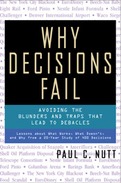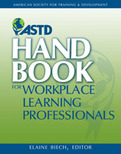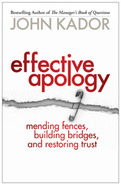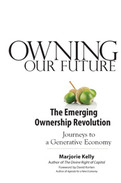2002
Why Decisions Fail translates decades of award-winning research into practical terms that managers can use to improve their own decision-making practices.
- Tells the stories behind the stories of such famous debacles as EuroDisney, Barings Bank, Ford Pinto, the Waco siege, and the Challenger tragedy
- Shows how to avoid the most common blunders and traps that lead to disaster
- Offers lessons about what works, what doesn't, and why from a twenty-year study of 400 decisions
- Speaks to managers by dealing with decisions that they must confront on a daily basis
Designed for use by professors and students in graduate-level programs in business, management, organizational leadership, and human resource development, Research in Organizations teaches how to apply a range of methodolgies to the study of organizations. This comprehensive guide covers the theoretical foundations of various research methods, shows how to apply those methods in organizational settings, and examines the ethical conduct of research. It provides a holistic perspective, embracing quantitative, qualitative, and mixed-methodology approaches and illuminating them through numerous illustrative examples.
ASTD Handbook for Workplace Learning Professionals is the definitive guide for learning professionals from the most trusted industry authority in the business. This 1000+ page case-bound book is a required desk reference for all learning professionals.
Packed full of key practices from adult learning theory, instructional design and delivery, measurement and evaluation, to human performance improvement and technology enabled learning. The Handbook brings together authors who represent the best practitioners in the field, authorities to present the most critical information to professionals like you. These luminaries of the workplace learning and performance (WLP) field include Bill Wiggenhorn, Geary Rummler, Robert Mager, Bill Byham, Elliot Masie, Donald Kirkpatrick, John Coné, Donnee Ramelli, and Tony Bingham. In addition, sidebars spread throughout the book introduce some of the most important contributors to the WLP field. Included in this volume is a complete glossary. Printed book includes a CD-ROM with supporting worksheets and tools.
ASTD Handbook may also be purchased by chapters from Fast Fundamentals: The BK Whitepaper Series.
Interested in licensing this title on your website? Contact [email protected]
today! Or visit ASTD’s Content Licensing Webpage
for more information.
2009
Effective Apology challenges you to think about the fundamental value of an apology, to you and the receiver, as it explores in detail the key dimensions—what Kador calls the Five Rs—of a wholehearted apology, one that heals and renews. Kador also offers advice on how to accept or reject an apology, ten apology dos and don'ts, and a quiz to test your Apology Quotient.
The willingness to apologize signals strength, character, and integrity—real leadership is impossible without it. With over 70 examples of the good, the bad, and the ineffective apology in action, no other book combines such a practical, how-to approach with a rich analysis of what it takes to make apology work in the real world.
2012
To understand these emerging alternatives, Kelly reports from all over the world, visiting a community-owned wind facility in Massachusetts, a lobster cooperative in Maine, a multibillion-dollar employee-owned department-store chain in London, a foundation-owned pharmaceutical company in Denmark, a farmer-owned dairy in Wisconsin, and other places where a hopeful new economy is being built. Along the way, she finds the five essential patterns of ownership design that make these models work.
- Offers a bold solution to our recurring economic crises: innovative new forms of institutional ownership
- Takes the reader on a global journey to meet the people and organizations that are pioneering new forms of life-sustaining ownership
- From the author of the classic The Divine Right of Capital
- Click here for the press release
Looking around at the wreckage left in the wake of the world economys latest crisis, veteran business journalist Marjorie Kelly noticed that some institutions were left relatively unscathed. What did they have in common? The key, Kelly realized, is seemingly obscure: ownership. Prominent among the survivors were organizations that combined the flexibility of traditional private ownership with a focus on the common good.
As long as businesses are set up to focus exclusively on maximizing quarterly returns for a limited group of individuals, the economy will be plagued by destructive boom-bust cycles. But now people are experimenting with new forms of ownership. We are in the midst of the most creative period of economic innovation since the dawn of the Industrial Revolution. Kelly calls these new forms generative: aimed at creating the conditions for life for many generations to come. They are in contrast to the dominant ownership designs of today, which can be called extractive: aimed at extracting short-term financial wealth.
To understand these emerging ownership alternatives, Kelly reports from all over the world, visiting a community-owned wind facility in Massachusetts, a lobster cooperative in Maine, a multibillion-dollar employee-owned department-store chain in London, a foundation-owned pharmaceutical in Denmark, a farmer-owned dairy in Wisconsin, and other places where an economy that works for all is being built.
This is not a moment for old solutions and tired approaches. As we enter a new era of limits, alternative ownership designs can help it become an era of fairness, sustainability, and community.
2009






















